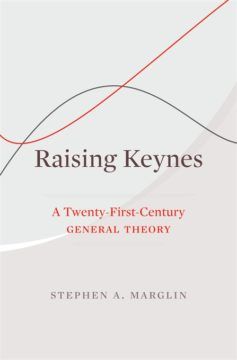 Nina Eichacker in Phenomenal World:
Nina Eichacker in Phenomenal World:
In 2022, the audience for books about John Maynard Keynes is probably as large as it has ever been. With two global economic crises followed by widespread use of government interventions, debates recently relegated to history books and academic journals have acquired new urgency. The curious reader can pick from a wealth of recent books. Geoff Mann’s In the Long Run We Are All Dead: Keynesianism, Political Economy, and Revolution (2017) and heterodox economist James Crotty’s Keynes Against Capitalism: His Economic Case for Liberal Socialism (2019) offer perspectives from critical political economy, while Zach Carter’s The Price of Peace: Money, Democracy, and the Life of John Maynard Keynes (2020) presents a detailed biography. But until now, there has been nothing quite like Stephen Marglin’s Raising Keynes, which subtly promises no less than A Twenty-first Century General Theory. The text runs to more than 896 pages, weighs four pounds in hardcover, and, as Marglin acknowledges, is not an easy read. But the result is truly original.
Marglin is uniquely positioned to carry forward the trajectory of the Keynesian tradition. Like Keynes, Marglin’s early career saw him transform from the star pupil of the reigning economic theories of his training—neoclassical economics—into a sort of a radical economist of his own category after receiving tenure. And, like Keynes, Marglin argues that it was his observation of the world around him that forced him to shed his allegiance to neoclassical theories and their claim to represent how the world works.
More here.
